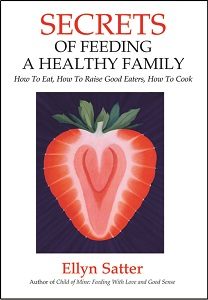

Family Meals Focus
The Ellyn Satter Institute Newsletter
Preventing holiday weight gain
by Jean Fain, LICSW, MSW Reprinted with permission from The Huffington Post
Sadly, too many party goers are more focused on their ever-spreading mid section than spreading holiday cheer. If all you really want for Christmas is the secret to overcoming overeating, you’re in luck. I recently discussed preventing seasonal weight gain with one of the leading experts on feeding our families and ourselves: Ellyn Satter. Before I devoured Satter’s writing on food and family, I gobbled up her definition on normal eating. Even if you’re familiar with Satter’s un-American definition, it’s worth rereading.
As a psychotherapist and dietitian, Satter understands why the majority of us feel compelled to eat like there’s no tomorrow. So when it came time for my annual interview on seasonal eating concerns, I could think of no better subject than the author of Secrets of Feeding a Healthy Family. What follows are questions and answers from my recent conversation with Ellyn Satter.
Fain. How would you describe normal holiday eating?
Satter. Normal eating is all about trusting yourself and giving yourself permission to eat in a way that is right for you. The trouble most people have with holiday eating is lack of permission. The oh-so-appealing party foods are on their “do not eat” list(s). Since these foods are “not all right,” the only way to eat them is to throw away all control and overdo it. So the standard definition of holiday eating becomes a lot.
Rather than haranguing yourself about what you should and shouldn’t eat, trust yourself to eat food you enjoy. Give yourself permission.
Fain. How about your approach to healthy eating: “Eating Competence.” How would you describe that?
Satter. Rather than haranguing yourself about what you should and shouldn’t eat, give yourself permission to eat food you enjoy. No food is off limits. Which isn’t to say you eat like there’s no tomorrow, nor do you even want to. With Eating Competence, you include food you really enjoy at meals and snacks, including food from your “do not eat” list(s). Then pay attention and enjoy your food. Trust yourself to eat as much as or as little as is right for you. It sounds wild and strange, but lots of research tells us being Eating Competent works.
Fain. What does Eating Competence look like at a holiday party?
Satter. You start by giving yourself permission, maybe even before you leave for the party. “It’s all right to eat; I just need to pay attention and enjoy.” Then at the party, take your plate and choose what you find most appealing. Sit down to eat if you can. If not, do what you need to do to enjoy your food: Stand in a quiet place, attach yourself to a group that will let you eat in peace. Discard the food that doesn’t taste as good as you thought it would. Go back for more as many times as you want and eat until you feel satisfied. That’s the opposite of the usual party eating, where a person doesn’t take time to eat. The food may taste good momentarily, but, because they’re not really paying attention, it’s just absent-minded munching.
Fain. What do you tell clients who are worried about gaining weight?
When I suggest what you’re suggesting, new clients say: “If I let myself eat whatever I want, I’d really pack on the pounds.”
Satter. Competent Eaters are less likely to gain weight over the holidays because all year long they let themselves eat as much as they want of the foods they enjoy. Holiday eating just gives more chances to eat good food. Even if you go home feeling too full, you can trust your body to not be as hungry the next day and you instinctively make up by eating less. In contrast, controlling eaters say: “I really overdid it! I have to cut down!” They deliberately under-eat, which sets them up for another bout of overdoing it. Come New Year’s, they feel they gotta get back on the diet. Then they fall off. This vicious cycle creates a lot of misery, and, in the long run, weight gain. The strange thing is that most people believe that being hard on themselves is somehow better than being positive and sympathetic. The data show that the opposite is true: People who are Eating Competent do better nutritionally, medically, and even emotionally than people who are hard on themselves with eating.
Fain. Can you say more about New Year’s resolutions?
Satter. People say: “I’m not going to eat all those delicious foods I love. I’m only going to eat fruits and vegetables and other ‘good’ foods.” Fruits and vegetables are wonderful, but if you’re eating them as penance, you’re not going to enjoy them. Then when you throw away control and eat what you really enjoy, you neglect them. Instead, think in terms of nutritional judo: go with your energy rather than fighting against it. Give yourself permission: Go with your desire to eat as much as you want of foods you enjoy. Provide yourself with structure, pay attention while you eat, and you are well on your way to being Eating Ccompetent.
Fain. How do you suggest parents help their children become Competent Eeaters?
Satter. Follow the Satter Division of Responsibility in Feeding (sDOR) throughout children’s growing-up years. Have meals and sit-down snacks, and regularly incorporate “forbidden foods.” Don’t restrict sugary, fatty foods. Depriving children of those foods does the same thing to children as it does to adults. Here’s how: If you have desert, give each person a single helping. Let them eat it when they want — before, during or after the meal. Use snack time to make up for limiting desert at mealtime. Periodically, get out the milk and a whole plate of cookies, and let children eat as many as they want. If they haven’t been allowed to eat cookies, they’ll eat a lot of them at first. But if you do this repeatedly, the newness will wear off. The child will eat a cookie or two and be fully satisfied. It works.
Fain. I can hear parents worrying their kids will get fat. What would you say to those parents?
Satter. In my experience, restriction is the big culprit with children and weight. Restricting kids doesn’t work. Forcing them to eat healthy foods doesn’t work. What works is following sDOR, trusting children to learn to eat the food you eat, and letting them grow up to get bodies that are right for them.
Explore
Understand and Apply ecSatter
Ellyn Satter’s Secrets of Feeding a Healthy Family says the secret of raising a healthy eater is to love good food, enjoy eating, and share that love and enjoyment with your child. When the joy goes out of eating, nutrition suffers.

